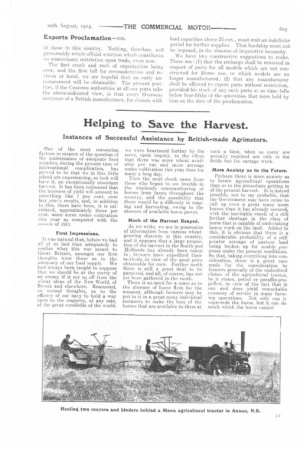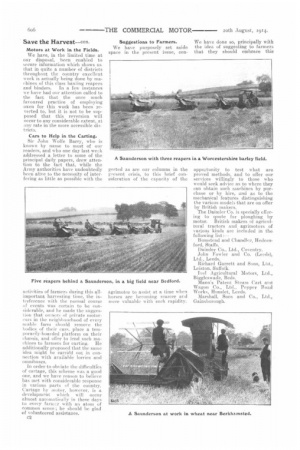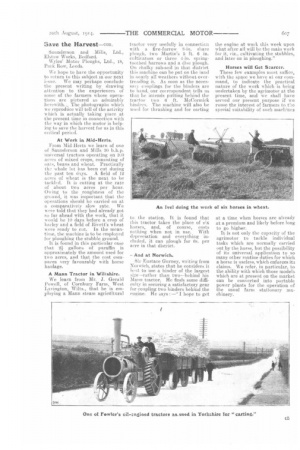Helping to Save the Harvest.
Page 7

Page 8

Page 9

If you've noticed an error in this article please click here to report it so we can fix it.
Instances of Successful Assistance by British-made Agrimotors.
One of the most reassuring factors in respect. of the question of the maintenance of adequate food supplies, during the present time of international complication, has proved to be that we in this little island are experiencing, as hick will have it. an exceptionally abundant harvest. It has been estimated that the increase of yield will amount to something like 7 per cent. over last year's results, and, in addition to this, there have been, it is calculated, approximately three per cent, more acres under cultivation this year as compared with the season of 1913.
First Impressions.
It was natural that, before we had all of us had time adequately to realize what this war meant to Great Britain, amongst our first thoughts were those as to the adequacy of our food supply. We had always been taught to suppose that we should be at the mercy of an enemy if it cut us off from the wheat ships of the New World, of R.nssia, and elsewhere. Reassured, on second thoughts, as to the efficacy of our navy to hold a way open to the majority, at any rate, of the great cornfields of the world, we were heartened further by the news, upon inquiry, to the effect that there was more wheat available per ear and mere acreage under cultivation this year than tor many a long day. Then the next shock came from those who began to see trouble in the wholesale commandeering of horses from farms throughout. the country, and the possibility that there would he a difficulty in reaping and harvesting, owing to the absence of available horse power.
Much of the Harvest Reaped.
As we write, we are in possession of information from various wheat. growing districts in this country, and it appears that a large proportion of the harvest in the South and Midlands has already been taken in ; farmers have expedited their methods, in view of the good price obtainable for corn. Further north there is still a great deal to be garnered, and all, of course, has not yet been gathered in the south.
There is no need for a scare as to the absence of horse flesh for the moment, although farmers may be put to it, in a great many individual instances to make the best of the horses that are available to them at
such a time, when so many are actually required not only in the fields but for cartage work.
More Anxiety as to the Future.
Perhaps there is more anxiety as to future agricultural operations than as to the immediate getting in of the present, harvest. It is indeed possible, not to say probable, that the Government may have cause to call up even a. great many more horses than it has already secured, with the inevitable result of a still further shortage in the class of horse that is capable of undertaking heavy work on the land. Added to this, it is obvious that there is a considerable probability of a still greater acreage of pasture land being broken up for arable purposes under the present conditions. So that, taking everything into consideration, there is a great case made foy the consideration by farmers generally of the undoubted claims of the agricultural tractor, be it steam, petrol or paraffin-propelled, in view of the fact that it can and . does yield remarkable economy of service in many farming operations. Not only can it supersede the horse, but it can do much which the horse cannot Motors at Work in the Fields. We have, in the limited time at our disposal, been enabled to secure information which shows us dial in quite a number of districts throughout the country excellent work is actually being done by machines of this class hauling reapers and binders. In a few instances we have had our attention called to the fact that the once much favoured practice of employing oxen for this work has been reverted to, but it is not to be supposed that this reversion will occur to any considerable extent, at any rate in the more accessible districts.
Cars to Help in the Carting.
Sir John Wolfe Barry, who is known by name to most of our readers, and who one day last week addressed a letter to some of the principal daily papers, drew attention to the fact that, while the Army authorities have undoubtedly been alive to the necessity of interfering as little as possible with the
activities of farmers during this allimportant harvesting time, the interference with the normal course of events was certain to be considerable, and he made the suggestion that owners ot private motorcars in the neighbourhood of every amble farm should remove the bodies of their ears, place a temporarily-boarded platform on their chassis, and offer to lend such machines to farmers for carting. He additionally proposed that the same idea might be carriM out in connection with available lorries and omnibuses.
In order to obviate the difficulties of cartage, this scheme was a good one, and we have reason to believe has /net with considerable response in various parts of the country. Cartage 1-)y motor. however, is a development which will occur almost automatically in these days to every farincr with an atom of Common sense ; he should be glad of volunteered assistance.
c2 Suggestions to Farmers.
We have plirposely set aside space in the present issue, con geted as are our columns in the present crisis, to this brief consideration of the capacity of the
agrimotor to assist at a time when horses are becoming scarcer and more valuable with such rapidity. We have done so, principally with the idea of suggesting to farmers that they should embrace this oppo.vtunity to test. what are proved methods, and to offer our services willingly to those who would seek advice as to where they can obtain such machines by purchase or by hire, and as to the mechanical features distinguishing the various models that are on offer by British makers.
The Daimler Co. is specially offering to quote for ploughing by motor. British makers of agricultural tractors and agrimotors of various kinds are included in the following list : Bunistead and Chandler, Hednesford, Staffs.
Daimler Co., Ltd., Coventry. John Fowler and Co. (Leeds), Ltd., Leeds.
Richard Garrett and Sons, Ltd., Leiston, Suffolk.
Tvel Agricultural Motors, Ltd., Biggleswade, Beds. Mann's Patent Steam Cart and Wagon Co., Ltd., Pepper Road Works, Hunslet, Leeds.
Marshall, Sons and Co., Ltd., Gainsborough. Sanuderson and Mills, Ltd., Elstow Works, Bedford.
Wyles' Motor Ploughs, Ltd., 1B, Park Row, Leeds. • We hope to have the opportunity to return to this subject in our next istic. We may perhaps conclude the present writing by drawing attention to the experiences of soma of the farmers whose operations are pictured so admirably herewith..-,,, The photographs which we reproduce will tell of the activity which is actually taking place at the present time in connection with the way in which the motor is helping to save the harvest for us in this critical period.
At Work in Mixt-Herts.
From Mid-Herts we learn of one of Saunderson and Mills an b.h.p. universal tractors operating an 1c0 acres of mixed crops, consisting of oats, beans and wheat. Practically tha whole lot has been cut during i,hc past ten days. A field of 12 acres of wheat is the next to be tacklod. It is cutting at the rate of about two acres per hour. Owing to the roughness of the ground, it. was important that the operations should be carried on at comparativeiy slow rate. We were told that they had already got so far ahead with the work, that it would be 10 days before a crop of barley and a field of Rivett's wheat were ready to cut. In the meantime, the machine is to be employed for ploughing the stubble ground.
It is found in this particular case that 2:4 gallons of paraffin is approximately the amount nsed for two acres, and that the cost compares very favourably with horse haulage.
A Mann Tractor in Wiltshire.
We learn from Mr. J. Gerald Powell, of Cornbury Farm, West Lavington, Wilts., that he is employing a Mann steam agricultural
tractor very usefully in connection with a five-furrow B-in share plough, two Martin's 5 ft. 6 in. cultivators or three 4-in. springtoothed harrows and a .dise plough. On chalky sub-soil in that district this machine can be put on the land in nearly all weathers without overtreading it. As soon as the necessary couplings for the binders are to hand, our correspondent tells us that he intends putting behind the tractor two 6 ft. McCormick binders. Pri-m machine will also be used for thrashing and for carting
to the station. Tt is found that this tractor takes the place of six horses, and, of course, costs nothing when not in use. With chpreciation and everything included, it can plough for 6s, per acre in that district.
– And at Norwich.
Sir Eustace Gurney, writing from Norwich, states that he considers it lest to use a binder of the largest size—rather than two—behind his Maim tractor. He finds sonic difficulty in securing a satisfactory gear for coupling two binders behind the engine. He says :—" I hope to get
the engine at work this week upon what after all will he the main work for it, viz., cultivating the stubbles, and later on in ploughing."
Horses will Get Scarcer.
These few examples must suffice, with the space we have at our command, to indicate the practical nature of the work which is being undertaken by the agrimotor at the present time, and we shall have served our present purpose if wo rouse the interest of farmers to the special suitability of such machines at a time when horses are already at a premium and likely before long to go higher.
It is not only the capacity of the agrimotor to tackle individual tasks which are normally carried out by the horse, but the possibility of its universal application to so many other routine duties for which a horse is useless, which enforces its claims. We refer, in particular, to the ability wall which those models which are at present on the market can be converted into portable power plants for the operation or the usual farm stationary machinery.






































